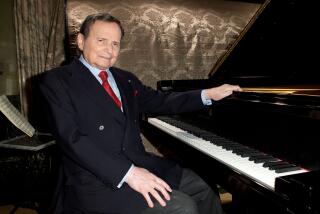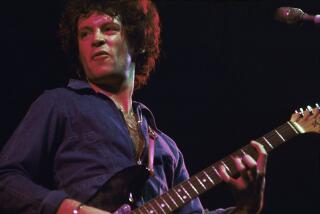Larry ‘Wild Man’ Fischer dies at 66; vagabond singer made albums with Frank Zappa
“Wanna buy a song for a dime?” For many startled UCLA students and Sunset Strip sightseers in the 1960s, that was the way Larry “Wild Man” Fischer introduced himself.
Anyone who took him up on his offer was rewarded with a brief, bellowing burst of nursery-rhyme-like verse, punctuated with unpredictable yelps and vocal sound effects from the disheveled troubadour.
Despite his unconventional approach and a lifelong struggle with severe mental illness, Fischer, who died Thursday of heart failure at Ronald Reagan UCLA Medical Center at age 66, went on to release several albums and became a cult figure — admired by some as an untamed practitioner of “outsider” art, but regarded less kindly by those who encountered the mercurial musician’s sudden bursts of aggression.
“When you’re working with somebody like Wild Man Fischer, or people who are ‘out there,’ the problems that arise after the album is completed sometimes become too much to bear,” Frank Zappa, Fischer’s most prominent patron, said in a 1970 interview.
“One thing that you must remember about Wild Man Fischer is that he actually is a wild person. And Larry is dangerous.”
The relationship between Zappa and Fischer ended one day at Zappa’s home, where Fischer — who suffered from manic depression and paranoid schizophrenia — became enraged and threw a bottle, barely missing Zappa’s baby daughter, Moon Unit.
Zappa had found something compelling in Fischer’s musical outbursts. He produced a documentary-like double-album, “An Evening with Wild Man Fischer,” and released it in 1968 on his Bizarre Records label.
Later, Fischer’s “Go to Rhino Records” was the first album released by the Rhino label, and the company went on to issue three Fischer albums, two of them produced by the comedy rock duo Barnes and Barnes, of “Fish Heads” fame.
“He made up songs that were beautiful and interesting,” Barry Hansen, a.k.a. radio host Dr. Demento, told The Times on Friday. “He didn’t always finish them — a lot of his work is fragments, but they’re great fragments.
“It’s a cliche, but everything he did came right out of him. There was no artifice, like there is with even the very best musicians. … It just erupted out of whatever part of the brain makes songs and without editing spilled out of his mouth and sometimes on the pieces of paper he used to sell.”
Fischer’s Zappa connection led to an appearance on “Rowan and Martin’s Laugh-In” on NBC, and Dr. Demento’s regular airings of “Merry Go-Round” and “My Name Is Larry” on his syndicated program endeared the musician to a small audience. But for most of his life he was frustrated by his lack of commercial success.
“One of the tragedies of his life was that Larry immediately assumed that because somebody who was famous had discovered him and recorded this elaborate double album, that Larry was going to be a superstar,” Hansen said. “And when that didn’t happen he found that very, very hard to handle.”
Lawrence Wayne Fischer was born Nov. 6, 1944, in Los Angeles. He attended Fairfax High School, but his home life was turbulent and he was sent to mental institutions as a teenager.
In the mid-’60s he began frequenting the hippie scenes of the Sunset Strip, UCLA and Venice. At one point he crossed paths with the colorful soul singer Solomon Burke, who gave Fischer the nickname “Wild Man.”
Even while he was making records — including a duet with Rosemary Clooney called “It’s a Hard Business” — Fischer maintained his vagabond lifestyle, living in low-rent motels and on the streets. He would present his panhandling performances at such venues as Dodger Stadium and Disneyland.
In 1988, the U.S. 9th Circuit Court of Appeals decided that Paramount Pictures’ license to use Fischer’s song “Merry-Go-Round” in the 1969 film “Medium Cool” did not apply to the movie’s videocassette release. That meant a potential paycheck for the songwriter, but at the time, his attorney didn’t know how to reach him.
According to Jeremy Lubin, producer of a 2005 documentary on Fischer called “Derailroaded,” the singer’s family persuaded him to go back on medications in 2004, after a 40-year hiatus. He moved into an assisted living facility in Van Nuys, where he lived quietly until he was hospitalized recently for heart problems.
His stabilization came with a price.
“Sadly, the cost associated with taking the medications to control that illness was that he completely lost what he called ‘the pep,’ ” Lubin said Friday. “The pep stemmed from that manic energy that would compel him to just burst out into song and write and create music. Once he started taking the medications, sadly that ended. He was no longer Wild Man Fischer. … He became Larry Fischer.”
Fischer is survived by his brother David Fischer of Agoura Hills and his sister Joyce Sherman of West Hills.
Services will be private.
Cromelin is a former Los Angeles Times staff writer.
More to Read
Start your day right
Sign up for Essential California for the L.A. Times biggest news, features and recommendations in your inbox six days a week.
You may occasionally receive promotional content from the Los Angeles Times.




















































